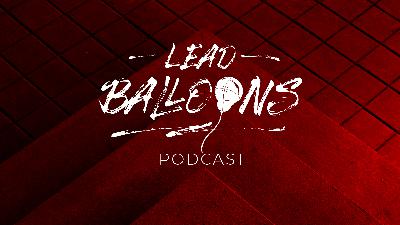Discover Lead Balloons: The Alchemy of Unpopular Opinions
Lead Balloons: The Alchemy of Unpopular Opinions

 Lead Balloons: The Alchemy of Unpopular Opinions
Lead Balloons: The Alchemy of Unpopular Opinions
Author: trentonkc
Subscribed: 1Played: 4Subscribe
Share
© Copyright 2023 All rights reserved.
Description
Exploring religious and cultural topics from the vantage point of insider and outsider. Joel and Trent have extensive theological training and have experienced life inside and outside the Church. Lead Balloons conversations seek to amuse, provoke, delight, and unsettle. Joel and Trent may be right, they may be wrong, and they like their opinions like they like their whiskey: hot to the taste, yet earthy - rooted like an oak.
62 Episodes
Reverse
Trent and Joel are closing a chapter. Maybe the Leadiest of Lead Balloons. The poet William Blake inspires their conversation with the Proverbs of Hell. They discuss Blake's challenge to conventional morality and religious dogma. They revel in the repression of desire. And they glory in the distinction between wisdom and folly. What a bang to go out on!?
Trent and Joel discuss the difficulties of doing theology. Joel gives an important backdrop of the transmission of the biblical text through the centuries and its relative reliability; Trent shows how systematic theology often fails to read biblical texts within their contexts. They also discuss why great literature, the Bible included, tends to invite further debate while repelling clarity and closure. Finally, Joel dishes on his experiences in presenting biblical ambiguities to his parishioners.
This episode features an interview with Miriam Thompson, Ph.D. Miriam is Assistant Teaching Professor at UCSB in the Department of Counseling, Clinical, and School Psychology. She wrote an essay titled “The Courage to Disagree in Academia”, published in Journal of Free Black Thought. This essay grabbed Trent and Joel’s attention.
In this discussion, Miriam argues for the need for free expression and facing disagreement in academic settings. She talks about why she disagrees with the claim that impact matters more than intent. She also discusses why tenure matters for professors and how she guides her students practically towards challenging their own belief systems. Joel and Trent ask her about her background, what led her to her perspectives on free speech, and where things are headed in the future with respect to free speech in academia.
Join us for this riveting interview that will make you consider the importance of confronting new ideas in one’s education.
Joel and Trent examine the decline in male friendship in recent decades. They discuss what might be preventing men from being proactive toward finding and maintaining friendships. They also cover the value of friendship, the importance of their own friendship, and how practicing vulnerability/authenticity might lead to more rewarding relationships.
Trent and Joel discuss Jesus' most well-known sermon from Matthew 5-7, known as "The Sermon on the Mount." Topics include hidden righteousness, Jesus' reframing and reinterpretation of OT laws, non-violence, and money. Joel reminds us of the need for a careful reading of this sermon: Jesus very likely did not deliver these words verbatim or all at once like this. Gospel writers had their own theological purposes and rehashed his teachings in accordance with those purposes. Trent wonders why Christians feel so certain about certain parts of Scripture, while appearing to not have even begun digesting Jesus' many sayings on the topic of wealth and money. Joel introduces us to philosopher Dallas Willard's unique take on the Beatitudes, which Willard claims are not to be taken as a new legalism.
This episode is a continuation to the previous episode as Trent and Joel explore the world of Sports Psychology. Not into sports? That's okay! These principles apply to daily living: work, relationships, coping with mistakes, and self-improvement. Trent highlights the psychological state of flow. Joel challenges the idea of manifesting and recommends visualization, instead. And don't miss Trent's hilarious story of almost pooping himself.
Joel and Trent dive into all the sporty words. Trent opines about the days when he was a speedster and Joel debates the value of G.O.A.T. debates. Towards the end, they dip their toe into Sports Psychology.
This discussion is about pluralism and whether it's a good thing. Pluralism is an acceptance and perhaps embrace of divergent viewpoints, cultures, and religions within a society. Trent and Joel talk about whether pluralism is a good thing and what kinds of skills and values it takes to find common ground with people who are different.
This is not a rosy-eyed discussion of "why can't we all just get along". The world has become super-connected and interdependent, and retreating into cultural cloisters is probably not as feasible as it may have been hundreds of years ago. Join Trent and Joel for this intriguing and timely episode!
Trent and Joel discuss violence in this episode. Topics include just war theory, pacifism, instances of violence in the Old Testament, favorite war movies, non-violence in Scripture, terrorism, and why empathy signals advanced intelligence.
Joel and Trent present to you...Joshua Harris! In this interview, they ask Joshua Harris about what it was like writing the bestseller I Kissed Dating Goodbye, how his changing views led him to discontinue its publication and repudiate some of its core principles, and what he is up to in his life and work now. They talk about the importance of admitting when you've been wrong and what it's like to make major life transitions that can be upsetting to people who have come to expect certain things from you. In the recap, Trent and Joel talk about Joshua's unique candor and striving for authenticity.
Trent interviews Joel about his experience working for two decades in pastoral ministry. They talk about sermon preparation, daily disciplines, civic engagement, suburban vs. urban contexts, the "call" to ministry, how much truth a congregation can handle, and the future of pastoral ministry in general. If you're curious about what one unique former pastor's experience was like, check this one out.
Joel is joined in this episode by his wife, Poonam, in which they interview Trent. The focus is Trent's unique path through life: spiritual transitions, career changes, and unconventional means. They discuss how to break out of tired, old scripts and try new things, even as they consider how to confront non-sexy challenges like paying bills and planning for retirement. This episode should challenge you to ask why you're living the way you do. And Trent, per usual, advocates for resisting the insane urge to become a workaholic.
Joel and Trent talk in this episode about forgiveness. When should we forgive? What does the process of forgiveness look like? Is it always right to forgive?
Trent seeks to add the terms "repair" and "reinstatement" to the discussion on forgiveness. He notes the financial metaphor within which forgiveness exists. Joel introduces us to the work of Everett Worthington on forgiveness, in addition to talking about the problem of "spiritual bypassing" in the context of processing wrongdoing.
This episode will challenge you to think deeply about the difficult topic of forgiveness.
Trent and Joel consider the deleterious impact of social media on individuals and culture. The backdrop is a recent article by Thom Hartmann, "Is Social Media This Generation's Heroin?" in which Hartmann examines the drug-like effects of social media. They consider the pro's and con's of social media. Joel describes the theory of the triune brain and how our survival instinct's hyper-sensitivity to threats is being hijacked by social media algorithms.
They agree that the public should be made more aware of social media algorithms, since they are so powerfully at work in our society. Trent talks about the differences between today's social landscape and times past when face-to-face contact entailed immediate consequences for cruel behavior.
Joel and Trent delve into the philosophical branch of epistemology, which is basically the study of knowledge and how humans come to know things. They talk about the social media landscape and knowledge; establishing foundations; the varieties of ways of knowing; data vs. interpretation of data; and the importance of rigorous but open-minded skepticism in today's world.
This episode gets a little nerdy, but it will challenge you to strive for both intellectual humility and honesty.
Trent and Joel interview Laura Kipnis, author of numerous books, including Love in the Time of Contagion; Men: Notes from an Ongoing Investigation; and Against Love. The discussion includes topics such as love, the utopian vision, Laura's inspiration to write, cynicism about the current cultural moment, whether or not Laura acts as a prophet, etc. She describes coming from a secular background but experiencing a unique variant of superstition. She also talks about her ability to see cultural movements before they happen, while talking about the "elephants in the room."
You'll appreciate Laura's candor and wit in this episode, and perhaps you'll be inspired to find and express your unique voice in a way only you know how.
True kids of the 90's, Joel and Trent chat about the importance of grunge music. They notice a dearth of lamentation and critique in what we often think of as Christian or church music, and they wonder if forms of music like grunge can help humans confront and embrace the darker aspects of our lives. Joel and Trent both talk about each of their favorite songs, one from Pearl Jam and one from Alice in Chains.
This episode will kindle your nostalgia for some of the great music of the 90's, while challenging you to think about the ways our culture can integrate greater authenticity. You may even rethink what biblical or Christian music should be all about.
Joel and Trent go deep on the topic of lying. Should we tell white lies when the truth is too hard to hear? What is the difference between evasion and equivocation? Are some people truly deluded, believing their own lies? They also discuss Jordan Peterson's master class in equivocation during a discussion with Richard Dawkins that was moderated by Alex O'Connor.
Joel and Trent seek to better understand what it means to be masculine and feminine. They discuss the biological realities and social inputs that make up our concept of gender. Joel talks about how the conventional model of masculinity was limiting as he grew into a man; Trent proffers the idea that a form of individualism might help some people steer in the right direction, rather than embracing the stereotypical gender norms. They also go into the theological terms "egalitarianism" and "complementarianism", which relate to male and female roles in the nuclear household.
Trent and Joel welcome to the podcast Pasha Dashtgard for an exciting and informative interview. Pasha is the Director of Research for the Polarization and Extremism Research and Innovation Lab (PERIL) at American University. Dr. Dashtgard holds the Ph.D. in Social Psychology from UC-Irvine.
Pasha discusses how young men can fall prey to online misinformation and nefarious algorithms that can result in their becoming radicalized. Joel and Trent ask him how he developed an interest in this work, what he is doing at PERIL to combat extremism in the manosphere, and whether there are any redeeming qualities to voices in the manosphere. Pasha shares ideas for how men can be directed toward better resources for personal growth and finding satisfying relationships.








